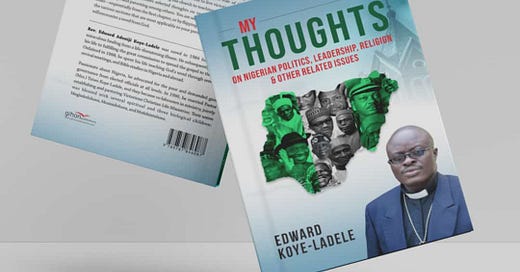S01E04: Growing through Feedback
Growing by welcoming, generalising, and acting on critical feedback
Hi hi,
Happy Sunday and my apologies for skipping last week! While this email was 90% written and ready to send last Sunday, I was forced to shelf it to focus on getting my dad’s book to print before its release next Saturday. It was a manic dash to the finish line but we’re there now. Wish me luck for the launch!
Today we’re considering growing through [critical] feedback. There are many definitions of feedback, but one I like is that feedback is information provided by someone else regarding aspects of your performance or understanding.
One of my favourite questions to ask in interviews is “tell me about a critical or tough piece of feedback you’ve received.” I love this question because my experience is that you can infer a lot about someone’s potential from their posture towards feedback. Do they give you a real example or a bullshit one? Are they defensive? Do they go away and reflect on feedback? Are they able to identify root causes of the behaviour so that they can apply the feedback in other situations?
Critical feedback can suck. I remember being told sometime in 2014 that I thought about my ideas for too long, therefore delaying my speed of execution, reducing the amount of time other people had to contribute, and causing me to be so invested that I was reluctant to incorporate other perspectives. It was very gently delivered by a great boss, but it still felt like a gut punch.
My first instinct was to be defensive. I wanted to explain that he didn’t get it, that he was criticizing one of my biggest strengths. But I forced myself to sit there and listen. I took notes on the examples he provided and told him I would think about it. Over the following weekend, I accepted that I had a bias for thinking, not one for action. To progress in my career, I would need to differentiate between one-way doors, where decisions were hard to reverse and required rigorous analysis and alignment, and two-way doors, where decisions were easily reversible and therefore should be made quicker.
That conversation continues to help me nine years after. I am very curious and my curiosity often results in a preference for thinking (and diving into rabbit holes) rather than acting. I still often use various tools to balance thinking and doing in my daily life and have a “bias for action” sticky up in my study.
To generalise, I think there are three elements to growing through feedback:
1. Seeking (or welcoming) it. Researchers have found a strong relationship between attitudes to feedback and job performance. People who actively seek commentary on how they are doing are more likely to uncover insights which they can then act on to improve the quality of their delivery.
2. Generalising and keeping track of the learnings. While good feedback is often linked to a specific example, it is unlikely that the behaviour was only present that one time. We should dig deeper for the root causes. For example, my bias for thinking was first flagged in a professional context but I quickly realised it was there in my personal life too.
3. Adjusting your approach to incorporate valid feedback. Doing something differently is the most important bit. If you get valid feedback and don’t course correct, then there was no point and you miss out on a great learning opportunity. Valid, because I don’t believe in accepting unfair feedback. While I sometimes let things slide given the context, there have been instances where I decided to set the record straight after reflecting on feedback and finding it unfair or inaccurate.
When I ask the “critical or tough piece of feedback…” question in interviews, I often get a superficial answer back. Something like, “I am a perfectionist etc” or “I have been told I work too hard etc”. I don’t let it go. I continue to probe until candidates reveal a real example. I think this is a difficult question to answer for two reasons: i) people fear that revealing real improvement areas may cost them the job, and ii) being self-critical is not comfortable. In my experience, candidates who answer this well tend to spend more time on the learning and the mitigation than on the improvement area.
Thank you for reading! To avoid sending two emails today, I’m going to postpone Futureproof (the one about algorithms being able to do a fair bit of my job) and will bring you “Five Years an MBA” next Sunday. See you then! Have a lovely week.
***
What I’m currently reading listening to watching: I’m still reading The Song of the Cell (see last week’s email), so I’m instead plugging a TV show I’ve enjoyed immensely over the past few weeks: Lessons in Chemistry on Apple TV. A few interesting things: 1) It’s based on the author’s debut novel which was published just before she turned 65! 2) Her first manuscript for a published work was rejected 98 times! 3) The novel was so good that it got adapted into a TV show within only a few months of release and stars Brie Larson (Captain Marvel)! There isn’t as much chemistry in the show as the title leads you to think but I still loved it very much!




Thanks,I learnt a lot from this! The feedback on bias for thinking also applies and I learnt one more way to switch to an action-biased mode